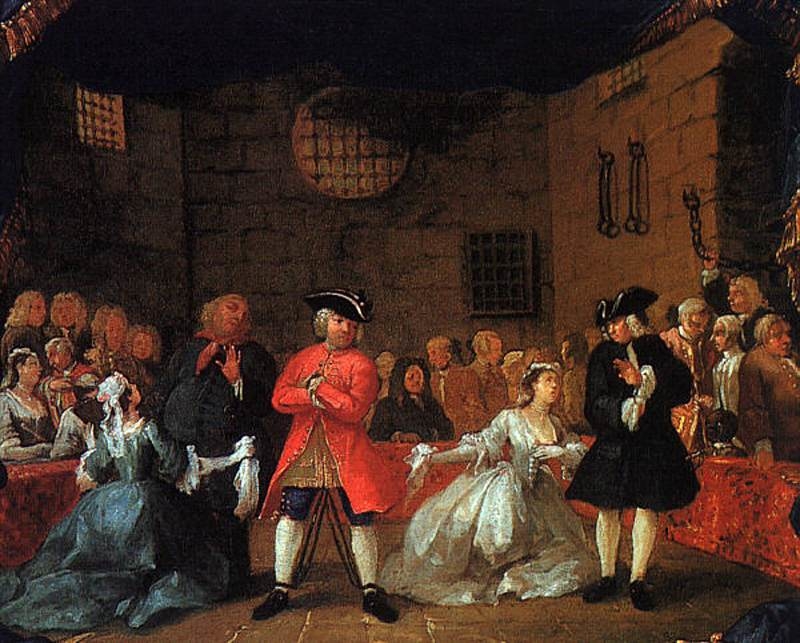
Monday
With the Senate voting to acquit and various Republicans making pilgrimages to Mar-a-Lago to kiss the ring, does this mean that Donald Trump has once more dodged accountability? While many supporters have paid a price, like John Gay’s Mack the Knife it appears that Trump has once again evaded the noose.
Indeed, the popularity of Macheath may give us insight into Trump’s continuing allure. Given that 18th-century audiences loved watching the impudent rogue repeatedly slip through the law’s clutches and that Frank Sinatra thrilled fans as he swaggered through Brecht’s and Weil’s lyrics (“When the shark bites with his teeth, dear/ Scarlet billows start to spread”), one can see why Trump fans cheered as the president flouted the law, norms, and general civility. The glamorous lawbreaker has long captured the public imagination.
Gay, incidentally, made direct equations between his highway man and the country’s leading statesman, prime minister Robert Walpole. At one point Macheath sings,
Through all the employments of life
Each neighbor abuses his brother;
Whore and rogue they call husband and wife,
All professions be-rogue one another.
The priest calls the lawyer a cheat,
The lawyer beknaves the Divine,
And the statesman because he’s so great,
Thinks his trade as honest as mine.
So will Trump continue to get away with his crimes? I think of an observation that Henry Fielding makes in Tom Jones on such matters. “There are a set of religious, or rather moral writers,” he writes,
who teach that virtue is the certain road to happiness, and vice to misery, in this world. A very wholesome and comfortable doctrine, and to which we have but one objection, namely, that it is not true.
To be sure, the structure of Fielding’s novel refutes his pessimism in that Tom’s virture in fact wins him both the fair Sophia and a landed estate whereas the villainous Blifil is stripped of his title and reduced to marital fortune hunting and…ppolitics?! For much of history, literarary structure has in fact carried a moral message. Miss Prism articulates this vision in an interchange from The Importance of Being Ernest, which features Wilde’s characteristic topsy-turvy wit:
Prism: Do not speak slightingly of the three-volume novel, Cecily. I wrote one myself in earlier days.
Cecily: Did you really, Miss Prism? How wonderfully clever you are! I hope it did not end happily? I don’t like novels that end happily. They depress me so much.
Prism: The good ended happily, and the bad unhappily. That is what Fiction means.
Fielding makes a similar point as he looks back at Greek tragedy, where a god-in-a-machine (deus ex machina) would be lowered on stage at the end of a performance to ensure that justice prevailed:
In this the ancients had a great advantage over the moderns. Their mythology, which was at that time more firmly believed by the vulgar than any religion is at present, gave them always an opportunity of delivering a favorite hero. Their deities were always ready at the writer’s elbow, to execute any of his purposes; and the more extraordinary the invention was, the greater was the surprise and delight of the credulous reader.
Even as Fielding questioned such fantasy interventions, moral accountability continued to be written into the structure of novels throughout the following century, and we find it in the fiction of Austen, the Brontes, Dickens, Hugo, Tolstoy, pretty much everyone. When an author finally showed virtue ending in unhappiness (Thomas Hardy in Tess of the d’Ubervilles: A Pure Women), readers were outraged.
If we can’t count on justice for Trump in this world, how about the next? Cynics and atheists like John Wilmot have long dismissed afterlife punishment as mere fantasy wish fulfillment:
For Hell and the foul fiend that rules
God’s everlasting fiery jails
(Devised by rogues, dreaded by fools),
With his grim, grisly dog that keeps the door,
Are senseless stories, idle tales,
Dreams, whimseys, and no more.
Dante, of course, gives the most complete accounting of what happens to evildoers after they die. And while Wilmot might dismiss Dante’s vision as senseless stories (Inferno even features the dog), the Florentine is actually a bit more sophisticated. The hell that people suffer after death is just a metaphorical description of the hell their evil visits upon them while they are still alive. I’ve written several times of the perpetual hell in which Trump finds himself: his anger boils him, his greed drags him down, his own fraud gets him to fear the hooks of others, his resentment gnaws away at him perpetually.
But even if we agree that Trump will pay some price, interior if not exterior, that’s scant consolation to those whom he has swindled. Voltaire makes this point in Candide when his protagonist thinks that providence has just intervened to balance the moral ledger:
The French captain soon saw that the captain of the victorious vessel was a Spaniard, and that the other was a Dutch pirate, and the very same one who had robbed Candide. The immense plunder which this villain had amassed, was buried with him in the sea, and out of the whole only one sheep was saved.
“You see,” said Candide to Martin, “that crime is sometimes punished. This rogue of a Dutch skipper has met with the fate he deserved.”
“Yes,” said Martin; “but why should the passengers be doomed also to destruction? God has punished the knave, and the devil has drowned the rest.”
Needless to say, people have been grappling with these ethical issues since the dawn of human history so there’s no easy reassurance to be had. Just keep in mind that, although life can certainly be unfair, Plato, Buddha, Jesus and others have compellingly argued that heaven is to be found in a virtuous life and hell in a vicious one.

